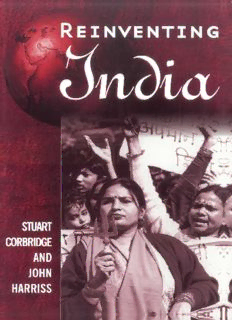
Reinventing India: Liberalization, Hindu Nationalism and Popular Democracy PDF
Preview Reinventing India: Liberalization, Hindu Nationalism and Popular Democracy
Reinventing India For the memory of our friend and mentor B. H. (Ben) Farmer, Reader in the Geography of South Asia, Fellow of St John’s College, and long-time Director of the Centre of South Asian Studies in the University of Cam bridge. Reinventing India Liberalization, Hindu Nationalism and Popular Democracy Stuart Corbridge and John Harriss Polity Copyright © Stuart Corbridge and John Harriss 2000 The right of Stuart Corbridge and John Harriss to be identified as authors of this work has been asserted in accordance with the Copyright, Designs and Patents Act 1988. First published in 2000 by Polity Press in association with Blackwell Publishers Ltd Reprinted 2006 Polity Press 65 Bridge Street Cambridge CB2 1UR, UK Polity Press 350 Main Street Maiden, MA 02148, USA All rights reserved. Except for the quotation of short passages for the purposes of criticism and review, no part of this publication may be reproduced, stored in a retrieval system, or transmitted, in any form or by any means, electronic, mechanical, photocopying, recording or otherwise, without the prior permission of the publisher. Except in the United States of America, this book is sold subject to the condition that it shall not, by way of trade or otherwise, be lent, re-sold, hired out, or otherwise circulated without the publisher’s prior consent in any form of binding or cover other than that in which it is published and without a similar condition including this condition being imposed on the subsequent purchaser. ISBN 0–7456–2076–0 ISBN 0–7456–2077–9 (pbk) A catalogue record for this book is available from the British Library. Library of Congress Cataloging-in-Publication Data Corbridge, Stuart. Reinventing India: liberalization, Hindu nationalism and popular democracy / Stuart Corbridge and John Harriss. p. cm. Includes bibliographical references and index. ISBN 0–7456–2076–0—ISBN 0–7456–2077–9 (pbk.) 1. India—Politics and government—1947–I. Harriss, John. II. Title. DS480.84.C783 2000 954.04—dc21 00-039986 Typeset in 10 on 11.5 pt Times by Kolam Information Services Pvt Ltd, Pondicherry, India Printed and bound in Great Britain by Marston Book Services Limited, Oxford This book is printed on acid-free paper. For further information on Polity, visit our website: www.polity.co.uk Contents Acknowledgements vii Abbreviations ix Glossary xi Map 1 Territorial growth of the East India Company, to 1843 xiv Map 2 Contemporary India xv Preface xvi Part I The Invention of Modern India 1 The Light of Asia? India in 1947 3 2 ‘Sovereign, Democratic, Federal, Socialist, Secular’: The Invention of Modern India 20 Part II Contested Modernities 3 The ‘Tall Men’ and the ‘Third Way’: Nehru, Patel and the Building of Modern India 43 4 Jealous Populism, Crises and Instability: Indira’s India 67 5 Drifting Towards Catastrophe: The Powerlessness of the Congress-(I) 93 6 ‘Elite Revolts’: Reforming and Reinventing India in the 1990s 119 Part III The Reinvention of India 7 The Dialectics of Reform: The State and Economic Liberalization 143 vi Contents 8 The Guilty Men? Militant Hinduism and the Politics of Anti-secularism 173 9 Transfers of Power? Subaltern Politics, Sites of Empowerment and the Reshaping of India’s Democracy 200 Conclusion 231 Notes 241 References 272 Index 297 Acknowledgements Both of us have researched in and on India throughout our professional lives, and this book is in part our attempt to make sense of that experience, stepping far beyond the particular engagements of our ‘field’ researches in Tamil Nadu, Bihar, Orissa and West Bengal. In its conception, design and writing, the book has involved each of us in equal measure; we hope that readers will find no awkward seams in our text. We are grateful to a number of friends and colleagues for sharing with us some of their own experiences as citizens or students of India, and for encouraging us in this venture: thank you, then, to Jim Bentall, Arvind Das, Haris Gazdar, Anil K. Gupta, Ronald Herring, Craig Jeffrey, Sarah Jewitt, Sudipta Kaviraj, Sanjay Kumar, Satish Kumar, James Manor, Emma Mawdsley, Saraswati Raju, V. K. Ramachandran, Sunil Sengupta, Manoj Srivastava and Rene Veron. We are also grateful to Alpa Shah and Glyn Williams for commenting on the drafts of some chapters, and, most especially, to Barbara Harriss-White in Oxford and Meghnad Desai and Chris Fuller at the LSE for their many detailed comments. In several places we have indicated where one or other of them cannot be entirely exonerated from responsibility for the interpretations that we offer, although for the rest we alone are responsible. We would also like to thank two anonymous referees for their helpful comments on a first draft of the book; P. Jacob, Deputy Editor of ‘Frontline’ (Chennai) for his courteous assistance; and Sandra Byatt, Sarah Dancy, Lynn Dunlop, David Held and Anna Oxbury for their editorial advice and support. We are also grateful to the University of Chicago Press for permission to reproduce as Map 1 a version of a map prepared by Matthew Edney for his book Mapping an Empire: The Geographical Construction of British India 1765-1843 (1997); and to Oxford University Press (India) for permission to viij Acknowledgements quote from P. Chatterjee, A Possible India: Essays in Political Criticism (1997). And for so many gifts that have nothing (much) to do with writing books a specially big ‘thank you’ to Joan and Joanne, and to Gundi, Mark, Kaveri and Elinor. S. C and J. H. Miami and London
Description: